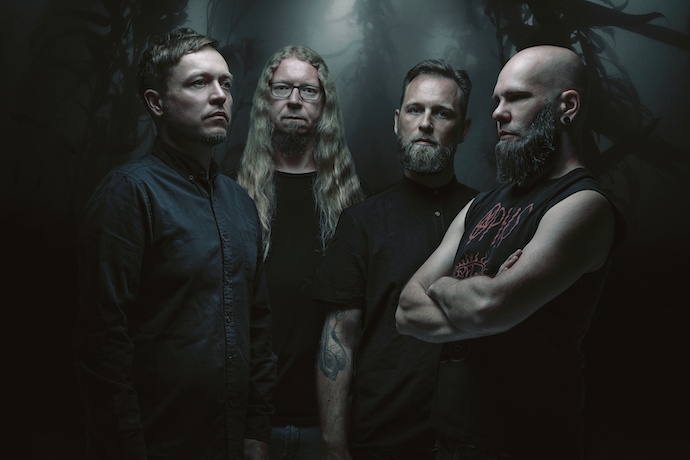
Photo by Stefan Heileman
(At last the leviathan Ahab has risen again from the watery depths with a new album that will be released by Napalm Records on January 13th, and we are most happy today to present Comrade Aleks‘ extensive interview with Ahab co-founder Daniel Dorste.)
It’s hard to believe but Ahab was founded 18 years ago. Back then the trio from Heidelberg, Baden-Württemberg consisting of Daniel Dorste (vocals, guitars, keyboards), Christian Hector (guitars) and Stephan Adolph (bass) tried to make funeral doom a bit more exciting and added strong nautical lines in their lyrics and, partly, in their music. So naturally their first album The Call of the Wretched Sea (2006) based on Herman Melville’s 1851 novel Moby Dick was labelled as “nautical doom”.
Ahab strengthened their positions with the second album The Divinity of Oceans (2009), retelling this time the true story of the Whale-Ship Essex, which in November 1820 was sunk in an attack by a sperm whale before the men resorted to cannibalism in order to survive. Such a grim fate… and yet you can’t play funeral doom and develop the same theme eternally, and so the band turned in a more progressive and atmospheric direction with the next album The Giant (2012).
This time Ahab adapted the mysterious novel The Narrative of Arthur Gordon Pym of Nantucket written by Edgar Allan Poe, and the plot itself demanded another approach. The Boats of the Glen Carrig (2015) took the band even further to the shores unknown just as it was in William Hope Hodgson‘s novel of the same name.
But then the band sunk to the bottom of the sonic ocean just like some weird fantastic submarine. Seven years have passed and Ahab now returns with The Coral Tombs album, which will see the light of day on the 13th of January through Napalm Records. The band’s sound seems to adopt new influences, even as Ahab’s crew has remained the same since 2008: the band’s founders Christian and Daniel, Cornelius Althammer (drums), and Stephan Wandernoth (bass). It is Daniel who joined our discussion.
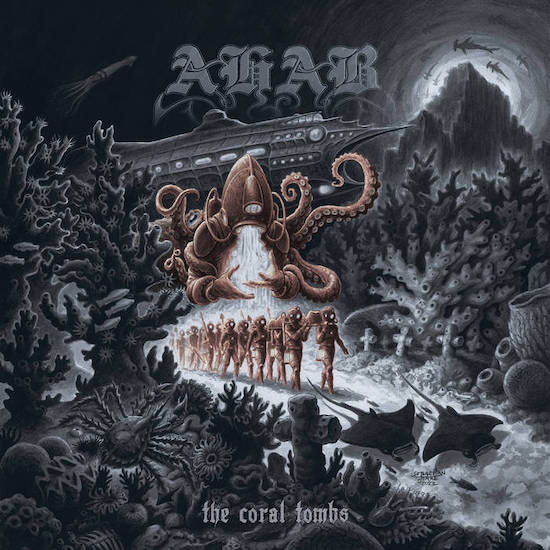
Ahoy Daniel! Thanks for your time and this opportunity to talk about the forthcoming new album The Coral Tomb. You’re on tour now, how do people react to the new songs?
We played two new songs on that tour and the reactions from people I spoke to are quite good so far. When I perform our music live on stage I’m very much into the music and focused on playing guitar and doing the vocals, so I didn’t observe the crowd continuously. But I saw many nodding heads and people didn’t leave the hall, so I guess that’s a good sign as well 🙂
There are just four dates in this mini-tour. Why didn’t you book more dates? Is it just enough for you?
Our main intention to go on the road was the possibility to play this show on the MS Stubnitz which is an old trawler in Hamburg, a perfect location for an AHAB show. So we just booked some few shows around that date in northern Germany. Almost all of us have kids now, so extensive touring wouldn’t be as easy as it would’ve been some years ago. Furthermore I just hadn’t more leave days left for 2022. It’s way easier for us to split a longer tour in shorter sections. So we’re planning to visit south Germany with another few dates maybe in spring 2023.
Well, first of all, where have you been all this time? The break between The Boats of the Glen Carrig (by the way, that’s a fantastic album) and The Coral Tomb is colossal! I checked and checked Ahab’s official medias and saw news like the release of the live album or the boxed-set tape collection, and it wasn’t encouraging. So what did happen?
After the release of The Boats of the Glen Carrig in 2015 we played some shows to promote the record. In early 2016 my daughter was born, so I took a few months’ break from the band to concentrate on the family. Between the years of our new record and the last album our families grew, there are five more children now, so almost every one of us had family issues and a hiatus during that time.
Although we didn’t release anything the interest in AHAB did not decrease, we got even more offers than we could accept. We also got no pressure from Napalm Records. Of course, they asked from time to time if we’re going to enter a studio soon, but there was no pressure at all. So, it was easy for us just to play some shows and to wait until the right time has come.
When we start writing a new record, we always start at zero again. There is no material for B-sides or something similar. We use the ideas we like 100% and delete everything else we like less. The songwriting for The Coral Tombs started during the first months of the pandemic. We weren’t able to meet all together in our rehearsal room, so Stephan and I met at my place to discuss some riffs I recorded. That’s when the structures for the first 3 new songs were created. Although we were “forced” to work like that, I have to say that this way of working was very effective and by that very important to wake us from our slumber.
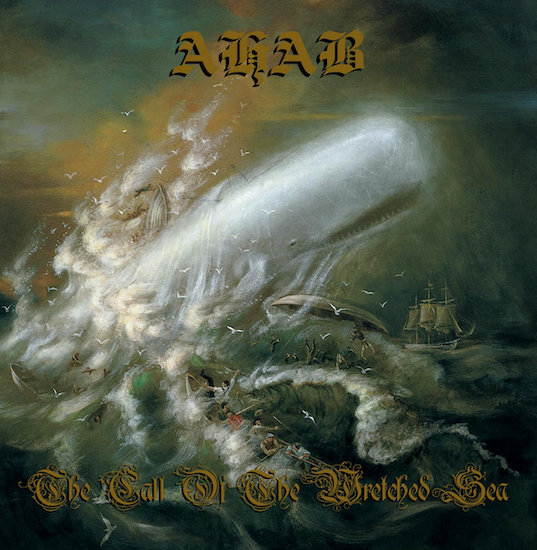
Your debut album The Call of the Wretched Sea was written in a funeral doom vein. It’s not one of most popular metal genres and there are not many relatively “popular” bands like Shape of Despair or Skepticism. Do you remember why you chose it to tell your vision of the Moby-Dick story?
In the early nineties, it was in ’92 I guess, a friend of mine introduced me to death-metal. I was impressed and fascinated about its brutality, it’s image, and instantly became a fan of Benediction, Carcass, Gorefest and all those great icons from that era. Two years later in 1994 two albums were released that really had a big impact on me, Tales from the Thousand Lakes by Amorphis and Hypocrisy’s The Fourth Dimension. I had already listened to brutal music before, but death-metal with atmosphere, that just blew me away. I’d say that these two records are responsible for me starting to compose music.
The first doom-metal record I ever listened to was Anathema’s Pentecost III. Bought this one during a language holiday in a record store in England. That was in 1995, I guess. I didn’t know that band before and I actually don’t remember why I bought it, but I instantly fell in love with its heaviness and monotony. I always searched for something similar in the years later, and discovered Paradise Lost and My Dying Bride, but nothing seemed to impress me as much again.
I constantly listened to death-metal in the years after, but lost the interest in doom-metal somehow.
In 2004 Chris and I went to the second edition of a small Doom-metal festival in south Germany called DOOM SHALL RISE. It was mainly traditional Doom Metal bands performing, but at that time we discovered funeral bands like Esoteric, Tyranny, and others. That slow, atmospheric and dark kind of doom-metal was the spark that enlightened my fascination for this genre again. It almost felt like discovering something new like it was back then in the nineties, and I instantly had to record a song at our former bassist’s small studio.
When Chris came up with the idea to found a Funeral Doom band to write a concept album about Melville’s Moby Dick, I showed him my song and we decided to join forces. That dark and heavy style of doom-metal seemed to be a perfect match to the atmosphere of Melville’s novel and the perfect tool to compose the story.
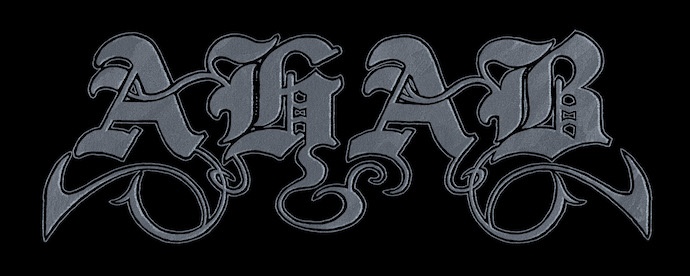
The band managed to break through the genre’s boundaries and developed from album to album. How natural was it? Do you remember how you discussed the changes you made in The Boats of the Glen Carrig with the other members?
For me it feels like the step from The Divinity of Oceans to The Giant was way bigger than the one we took to The Boats of the Glen Carrig afterwards. When I look back on the records we’ve released with Ahab so far, there’s only one record in our discography where we had a clear vision about the style of music we wanted to play to compose a story, and that was on The Call of the Wretched Sea. We wanted to use funeral-doom elements to retell Melville’s Moby Dick. Every Ahab record that followed was a natural development that just happened without any purpose.
If you’re composing a finished story you’re composing on purpose of course, but we didn’t try to sound like a specific genre in the years after. Of course there are discussions sometimes about riffs or the progression of a song, but genres never were part of these discussions. We’re all open minded when it comes to musical genres and there are roots in our sound we’d keep for sure, but besides I’m absolutely sure that none of us would stand against a natural progression.
How often do you get criticism from purists who blame you for leaving your funeral roots?
Well sometimes there are people worrying about the development we made musically, but those are really just a few compared to the rest I’ve read in comment sections so far. I’m absolutely fine with someone telling me that our first album was his or her favourite, because I feel the same about quite a few bands I listen to. I prefer the first Anathema releases to their newer stuff, my favourite Opeth record is Blackwater Park, and World Demise is Obituary’s last album I was really interested in.
Playing music and listening to music is something very different. I like listening to AC/DC from time to time and it’s good that there are bands like them keeping their style for decades. But I could never imagine being part of a band that never wanted to leave their roots to evolve..
To blame a band just for following a natural development is just stupid. If you don’t like it just don’t buy it. Following a natural development is essential for a band to stay authentic, and that’s something very important for us.
You already shared the first single heralding the new album — it’s “Prof. Arronax’ Descent into the Vast Oceans”. And I bet that the feedback you got is encouraging. Did you expect that people would get your new material?
We knew that the beginning of the song would surprise most of the listeners, but that was on purpose. When we released “Like Red Foam” as the first single from The Boats of the Glen Carrig we got quite mixed reactions back then. The content of its video was very special and “unnautical”, the song was special as well, and many may have been afraid that we’d do something completely different on that record. The first minute of “Prof. Arronax” is so exaggerated in terms of an Ahab song that it is just obvious that the rest of the album just wouldn’t sound like that, so yes… I’m sure that people will get our new album.
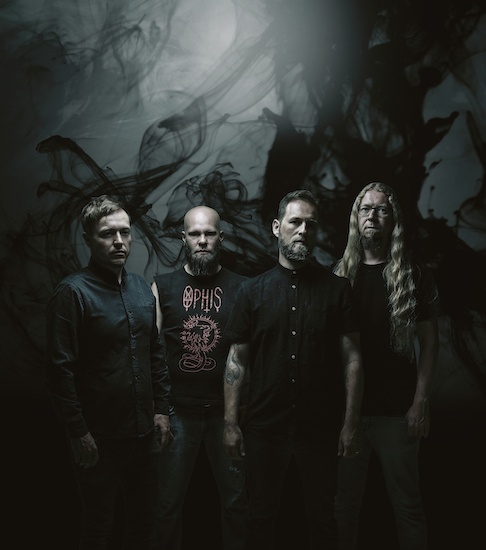
Photo by Stefan Heilemann
Does this track give the right impression of the whole album?
The track “Prof. Arronax’ Descent into the Vast Oceans” is the opening track of our new record. It is meant as the entrance to the story as well as introducing the musical main theme. We’ve chosen this track as the first single because its thundering and extraordinary beginning is a punch in the face heralding our return after years of silence. Of course, it shows some shades of the record, but there is a lot more to discover on The Coral Tombs.
How much of between The Boats of the Glen Carrig will we find in The Coral Tombs? What was your initial vision of this material when you entered the studio?
The main vision was, like always, to interpret a novel, one of Jules Verne’s novels this time. We had a clear vision about the sound of that record. We were satisfied with every record we’ve done with Jens Siefert at RAMA Studios in Mannheim, but we wanted to achieve a dirtier guitar sound this time. So, we spent quiet a lot of time in checking amp tones, various combinations of amplifiers and cabinets, until we’ve found the right guitar tone for the record.
When it comes to the composing process of a song, I try not to look back at what we’ve done before. There’s so much time between The Boats of the Glen Carrig and The Coral Tombs that it’s just impossible that they’d sound too similar. There are similarities of course — we’re still the same four guys playing slow metal music — but there are also new elements in our sound to discover. Before entering the studio I had a vision how these new songs could sound together on a record as a unit, but the whole picture doesn’t unfold until the production process is finished. I would agree that there are more clean vocals on our new record, that its atmosphere differs from its predecessor, but I’d never go as far as to go into a deep analysis to compare both.
Well, I know what we aren’t in a position to choose, but honestly the song’s official video looks like a National Geographic documentary. May we expect more videos from the band in this or another style?
The video for “Professor Arronax” was a lyric video done by Chris. There will be two more videos, both in very different styles. The second one should already be released as these lines are published. [And here it is:]
On the other hand, the artwork of The Coral Tomb is absolutely fantastic! How did you collaborate with Sebastian Jerke? Did you discuss with him some certain ideas?
Sebastian is a really talented artist who puts so much effort into every project he’s involved in. Before we start discussing any sketches he’s actually always reading the novel we’re composing first. We then start discussing what painting style/techniques we prefer and send him some examples; Hieronymus Bosch was one of them this time. We discuss possible main sceneries, central elements, and the coloration of the cover, and as the next step he starts drawing the first sketches. I remember when we got his first sketches for The Giant cover. He even scaled the size of a whale and various other sea creatures to the giant to emphasize his size.
As soon as the main scenery is finished, we discuss the details of the cover. If we’re happy with the positioning of every element he sends various colorations again. In opposite to The Boats of the Glen Carrig we wanted to use grey shades only plus one additional colour this time… but nevertheless, there were many variations he sent to choose from. Finally, as the last step, he repainted everything in India ink again before he started creating the inlay of the booklet.
Did you watch the cinematic adaptations of the Verne novel? Do you have a favorite one?
I actually didn’t know that there are several movies about that story to be honest. The only adaption I know is that Disney version from 1954 with Kirk Douglas and James Mason as Captain Nemo. I really like this one, I remember that I always tried to watch it as a child whenever it was on TV…. and just because there are so many childhood memories connected to that movie, I guess I couldn’t enjoy any newer adaption of 20000 Leagues… Even if a newer version would for sure have better effects and stuff, that Disney version has a lot of charm for me, and that’s way more important than special effects, and impossible to recreate.
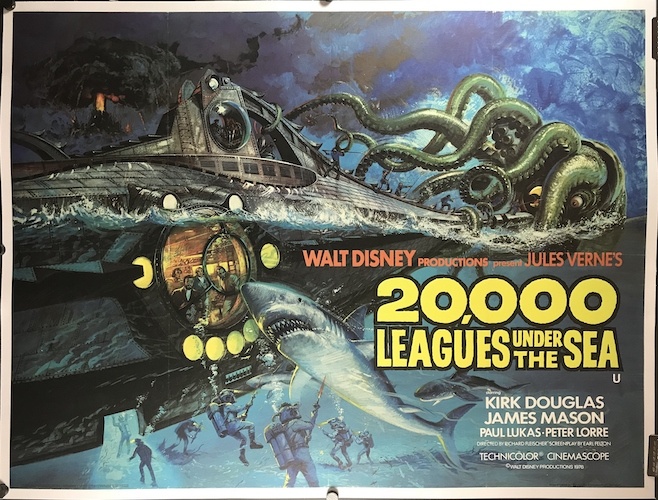
I was surprised but I found the interview we did with Christian in 2007 and he mentioned Twenty Thousand Leagues Under the Sea as a possible concept for one of the next Ahab albums. What stopped you from using this concept earlier?
Well, it just wasn’t the right time. We never plan the development of our music, like I mentioned above, but we are very picky about the literature we’re composing. By choosing a novel we’re composing, we also set the course for the musical direction we’re going to follow with that record… not in detail of course, but at least we’re setting a vague frame. I haden’t read the book at that time, and the Disney movie of 20000 Leagues… alone isn’t a good template for grunts and heavy riffs.
Twenty Thousand Leagues Under the Sea grants a rich basis for building your own story, or you can focus on one of the novel’s layers and talk about unspoken horrors of the deep seas, fantastic adventures, or even social riots. What is the central lyrical motive of the album?
The frame of the lyrics is as always a nautical environment. Besides specific chapters/scenes of the story we decided to take a deeper look at the mysterious main character of the story. So the storyline of the album is not just retelling the story chronologically, it is also focusing on Captain Nemo and his aversion and hatred of the world.
Did you think to record a double-album about Captain Nemo?
There would have been enough content in the story for sure but no, that was never part of any discussion. Recording an album properly costs quite a lot of time and money, and we are limited on both.
How do you think… would Jules Verne dig the album? : )
Maybe he’d like parts of the music, but as an author I guess he’d also be interested in the vocals, or rather in understanding the lyrics. So I think that he could have disliked my growling for sure 🙂
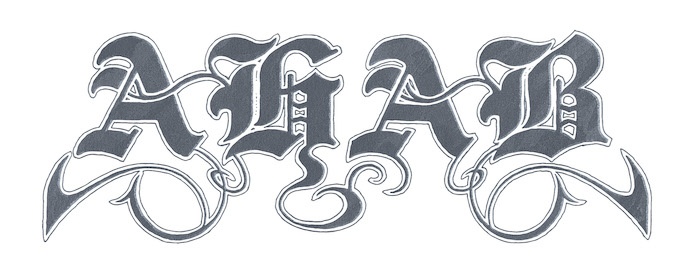
There are two guests taking part in The Coral Tomb – Chris Noir whom we already heard on “Prof. Arronax’ Descent into the Vast Oceans”, and Greg Chandler of ultra-extreme and psychedelic Esoteric. And both are known with their own distinctive style (Greg is just a monster with all his demonic equipment)… How did it happen that you invited them? Did you find that certain lines needed their specific approach?
Well for “Professor Arronax” we were searching for a vocal contrast to my voice. The arrangement of the lyrics was just perfect to split theses first lines for two vocalists, and the fast riff with the blast beats was also perfect for a black metal voice. Chris and I sat in my kitchen and listened to different vocalists and finally I showed him an Ultha song. We both agreed that Chris Noir would be a great option. We didn’t know him personally so we just wrote a mail to ask if he’d be interested in participating on our new record, and luckily he agreed.
Greg Chandler is a friend of ours since we’ve been on tour together in 2012. Chris and I were fans of his band Esoteric even before Ahab existed. Greg‘s vocal part is in closing The Coral Tombs, in a part dealing with drowning in a maelstrom. His vocals combined with all the sick effects he’s using on that part, that’s a perfect match. I remember when I first heard the final version of that song in my car on my way to work. I had goosebumps all over and a big smile in my face at the same time. His band was a huge inspiration for us and one of the reasons we decided to found a doom metal band. It’s a real honour to have this guy on our record!
Thank you for your answers and patience Daniel. It’s good to finally see that Ahab rises to the surface! Would you like to add a few more words for our readers?
Well thank you very much for the possibility to talk about our new album The Coral Tombs. I’d also like to thank those who have followed and supported us over the years!
https://www.facebook.com/AhabDoom

I perfectly understand that time and financial resources are limited, but I really hope that playing live won’t be limited to north and south Germany. Come over to Belgium !
I’ll buy you guys a trappist beer if you do 😉